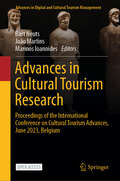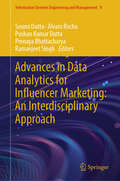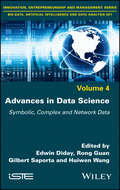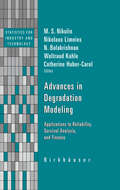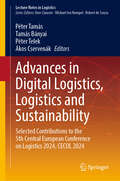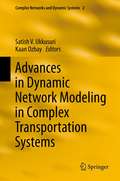- Table View
- List View
Advances in Cryptology – EUROCRYPT 2017: 36th Annual International Conference on the Theory and Applications of Cryptographic Techniques, Paris, France, April 30 – May 4, 2017, Proceedings, Part I (Lecture Notes in Computer Science #10210)
by Jesper Buus Nielsen Jean-Sébastien CoronThe three-volume proceedings LNCS 10210-10212 constitute the thoroughly refereed proceedings of the 36th Annual International Conference on the Theory and Applications of Cryptographic Techniques, EUROCRYPT 2017, held in Paris, France, in April/May 2017. The 67 full papers included in these volumes were carefully reviewed and selected from 264 submissions. The papers are organized in topical sections named: lattice attacks and constructions; obfuscation and functional encryption; discrete logarithm; multiparty computation; universal composability; zero knowledge; side-channel attacks and countermeasures; functional encryption; elliptic curves; symmetric cryptanalysis; provable security for symmetric cryptography; security models; blockchain; memory hard functions; symmetric-key constructions; obfuscation; quantum cryptography; public-key encryption and key-exchange.
Advances in Cryptology – EUROCRYPT 2017: 36th Annual International Conference on the Theory and Applications of Cryptographic Techniques, Paris, France, April 30 – May 4, 2017, Proceedings, Part II (Lecture Notes in Computer Science #10211)
by Jesper Buus Nielsen Jean-Sébastien CoronThe three-volume proceedings LNCS 10210-10212 constitute the thoroughly refereed proceedings of the 36th Annual International Conference on the Theory and Applications of Cryptographic Techniques, EUROCRYPT 2017, held in Paris, France, in April/May 2017. The 67 full papers included in these volumes were carefully reviewed and selected from 264 submissions. The papers are organized in topical sections named: lattice attacks and constructions; obfuscation and functional encryption; discrete logarithm; multiparty computation; universal composability; zero knowledge; side-channel attacks and countermeasures; functional encryption; elliptic curves; symmetric cryptanalysis; provable security for symmetric cryptography; security models; blockchain; memory hard functions; symmetric-key constructions; obfuscation; quantum cryptography; public-key encryption and key-exchange.
Advances in Cryptology – EUROCRYPT 2017: 36th Annual International Conference on the Theory and Applications of Cryptographic Techniques, Paris, France, April 30 – May 4, 2017, Proceedings, Part III (Lecture Notes in Computer Science #10212)
by Jesper Buus Nielsen Jean-Sébastien CoronThe three-volume proceedings LNCS 10210-10212 constitute the thoroughly refereed proceedings of the 36th Annual International Conference on the Theory and Applications of Cryptographic Techniques, EUROCRYPT 2017, held in Paris, France, in April/May 2017. The 67 full papers included in these volumes were carefully reviewed and selected from 264 submissions. The papers are organized in topical sections named: lattice attacks and constructions; obfuscation and functional encryption; discrete logarithm; multiparty computation; universal composability; zero knowledge; side-channel attacks and countermeasures; functional encryption; elliptic curves; symmetric cryptanalysis; provable security for symmetric cryptography; security models; blockchain; memory hard functions; symmetric-key constructions; obfuscation; quantum cryptography; public-key encryption and key-exchange.
Advances in Cultural Tourism Research: Proceedings of the International Conference on Cultural Tourism Advances, June 2023, Belgium (Advances in Digital and Cultural Tourism Management)
by Marinos Ioannides João Martins Bart NeutsThis open access book pertains to the "International Conference on Cultural Tourism Advances," held on June 27 and 28, 2023, at KU Leuven, Belgium. It focuses on advancing understanding of the sustainable development potential of cultural tourism by examining successful policy interventions, emerging cultural tourism trends, advancements in visitor management systems, new business and governance models, and the opportunities arising from ICT in the twenty-first century. This book presents recent key advances and their significant outcomes in the domain of European Cultural Tourism.
Advances in Data Analytics for Influencer Marketing: An Interdisciplinary Approach (Information Systems Engineering and Management #9)
by Álvaro Rocha Soumi Dutta Pronaya Bhattacharya Pushan Kumar Dutta Ramanjeet SinghIn the ever-evolving landscape of digital marketing, influencer marketing has emerged as a game-changer, captivating audiences and driving brand engagement like never before. However, success in this dynamic field requires more than just intuition—it demands a mastery of data analytics and an interdisciplinary approach. Introducing this groundbreaking book equips marketers, analysts, and business leaders with the tools and strategies to navigate the complexities of influencer marketing with precision and confidence. Written by leading experts in the field, this comprehensive book explores the intersection of data analytics, consumer behavior, and influencer marketing, offering a holistic perspective on this powerful marketing technique. This book equips the readers with the knowledge and tools to stay ahead of the curve and drive unparalleled success in the ever-evolving world of influencer marketing.
Advances in Data Science: Symbolic, Complex, and Network Data
by Gilbert Saporta Edwin Diday Rong Guan Huiwen WangData science unifies statistics, data analysis and machine learning to achieve a better understanding of the masses of data which are produced today, and to improve prediction. Special kinds of data (symbolic, network, complex, compositional) are increasingly frequent in data science. These data require specific methodologies, but there is a lack of reference work in this field. Advances in Data Science fills this gap. It presents a collection of up-to-date contributions by eminent scholars following two international workshops held in Beijing and Paris. The 10 chapters are organized into four parts: Symbolic Data, Complex Data, Network Data and Clustering. They include fundamental contributions, as well as applications to several domains, including business and the social sciences.
Advances in Degradation Modeling: Applications to Reliability, Survival Analysis, and Finance (Statistics for Industry and Technology)
by Nikolaos Limnios Waltraud Kahle N. Balakrishnan Catherine Huber-Carol M. S. NikulinThis volume is a collection of invited chapters covering recent advances in accelerated life testing and degradation models. The book covers a wide range of applications to areas such as reliability, quality control, the health sciences, economics and finance. It is an excellent reference for researchers and practitioners in applied probability and statistics, industrial statistics, the health sciences, quality control, economics, and finance.
Advances in Design Engineering II: Proceedings of the XXX International Congress INGEGRAF, 24-25 June, 2021, Valencia, Spain (Lecture Notes in Mechanical Engineering)
by Guillermo Peris-Fajarnes Paz Morer Camo Francisco Cavas Martínez Ismael Lengua Lengua Beatriz Defez GarcíaThis book contains the papers presented at the XXX International Congress INGEGRAF, “Digital Engineering, its application in Research, Development and Innovation”, held on 24–25 June 2021 in Valencia, Spain.The book reports on cutting-edge topics in product design and manufacturing, such as industrial methods for integrated product and process design; innovative design; and computer-aided design. Further topics covered include virtual simulation and reverse engineering; additive manufacturing; product manufacturing; engineering methods in medicine and education; representation techniques; and nautical, engineering and construction, aeronautics and aerospace design and modeling. The book has six sections, reflecting the focus and primary themes of the conference. The contributions presented here will not only provide researchers, engineers, and experts in a range of industrial engineering subfields with extensive information to support their daily work; but also they are intended to stimulate new research directions, advanced applications of the methods discussed, and future interdisciplinary collaborations.
Advances in Design Engineering III: Proceedings of the XXXI INGEGRAF International Conference 29–30 June, 1 July 2022, Málaga, Spain (Lecture Notes in Mechanical Engineering)
by Francisco Cavas-Martínez Ramón Mirálbes Buil Manuel D. Marín Granados Oscar D. de-Cózar-MacíasThis book contains the papers presented at the XXXI International Congress INGEGRAF “Graphic Expression: reunion, reflection, representation,” held on June 29–30 and July 1, 2021, in Málaga, Spain. It reports on cutting-edge topics in product design and manufacturing, such as industrial methods for integrated product and process design, innovative design and computer-aided design. Further topics covered include virtual simulation and reverse engineering, additive manufacturing, product manufacturing,engineering methods in medicine and education, representation techniques and nautical, engineering and construction, aeronautics and aerospace design and modeling. The book is divided into six main sections, reflecting the focus and primary themes of the conference. The contributions presented here provide researchers, engineers and experts in a range of industrial engineering subfields with extensive information to support their daily work; but also they are intended to stimulate new research directions, advanced applications of the methods discussed and future interdisciplinary collaborations.
Advances in Design Engineering IV: Proceedings of the XXXII INGEGRAF International Conference 21–23 June, Cádiz, Spain (Lecture Notes in Mechanical Engineering)
by Cristina Manchado del Val Miguel Suffo Pino Ramón Miralbes Buil Daniel Moreno Sánchez Daniel Moreno NietoThis book presents the cutting-edge research showcased at the XXXII International Congress INGEGRAF, held in Cádiz, Spain from 21-23 June 2023. It highlights the latest advances in product design and manufacturing, including industrial methods for integrated product and process design, innovative design, and computer-aided design. The book covers a broad spectrum of topics, including virtual simulation and reverse engineering, additive manufacturing, product manufacturing, engineering methods in medicine and education, representation techniques, and nautical, engineering and construction, aeronautics and aerospace design, and modeling.The book is organized into main sections that reflect the focus and primary themes of the conference. The contributions in this book provide extensive information and insights to support the daily work of researchers, engineers, and experts in various industrial engineering subfields. Additionally, the book intends to inspire new research directions, promote advanced applications of the discussed methods, and foster future interdisciplinary collaborations.
Advances in Design Engineering: Proceedings of the XXIX International Congress INGEGRAF, 20-21 June 2019, Logroño, Spain (Lecture Notes in Mechanical Engineering)
by Francisco Cavas-Martínez Félix Sanz-Adan Paz Morer Camo Ruben Lostado Lorza Jacinto Santamaría PeñaThis book gathers the papers presented at the XXIX International Congress INGEGRAF “The digital transformation in graphic engineering,” which was held in Logroño, Spain on June 20–21, 2019. It reports on cutting-edge topics in product design and manufacturing, such as industrial methods for integrated product and process design; innovative design; and computer-aided design. Further topics covered include virtual simulation and reverse engineering; additive manufacturing; product manufacturing; engineering methods in medicine and education; representation techniques; and design and modeling for nautical, engineering and construction, aeronautics and aerospace contexts. The book is divided into six main sections, reflecting the focus and primary themes of the conference. The contributions presented here will not only provide researchers, engineers and experts in a range of industrial engineering subfields with extensive information to support them in their daily work, but will also stimulate new research directions, advanced applications of the methods discussed, and future interdisciplinary collaborations.
Advances in Design, Simulation and Manufacturing VII: Proceedings of the 7th International Conference on Design, Simulation, Manufacturing: The Innovation Exchange, DSMIE-2024, June 4–7, 2024, Pilsen, Czech Republic - Volume 1: Manufacturing Engineering (Lecture Notes in Mechanical Engineering)
by Vitalii Ivanov Justyna Trojanowska Ivan Pavlenko Erwin Rauch Ján PiteľThis book reports on advances in manufacturing, with a special emphasis on smart manufacturing and information management systems. It covers sensors, machine vision systems, collaborative technologies, industrial robotics, digital twins, and virtual and mixed reality. Further topics include quality management, supply chain, agile manufacturing, lean management, and sustainable transportation. Chapters report on theoretical research and experimental studies concerning engineering design, simulation, and various machining processes for subtractive and additive manufacturing. It also discusses key aspects related to engineering education and competence management in the Industry 4.0 era. Based on the 7th International Conference on Design, Simulation, Manufacturing: The Innovation Exchange (DSMIE-2024), held on June 4-7, 2024, in Pilsen, Czech Republic, this first volume of a 2-volume set provides academics and professionals with extensive information on technologies, trends, challenges, and practice-oriented experience in all the above-mentioned areas.
Advances in Digital Logistics, Logistics and Sustainability: Selected Contributions to the 5th Central European Conference on Logistics 2024, CECOL 2024 (Lecture Notes in Logistics)
by Ákos Cservenák Péter Tamás Tamás Bányai Péter TelekThis book offers a timely snapshot of cutting-edge research and practice in the field of logistics. It covers a range of cutting-edge topics relating to sustainability, digitalization and education, together with traditional ones, such as optimization of supply chain, production processes, storage and material handling. Gathering the best papers presented at the 5th Central European Conference on Logistics 2024, CECOL 2024, held on April 22–24, in Miskolc, Hungary, this book reports challenges in logistics, together with updated methods and strategies to solve classical and future logistics problems in the context of industry 4.0
Advances in Digital Manufacturing Systems: Technologies, Business Models, and Adoption
by R. P. Sundarraj Svetan Ratchev Kulwant S. Pawar R. K. AmitThis book contains contemporary discussions on technology, business models, and the adoption of digital manufacturing systems. The book's initial chapters cover technological details underpinning the digital manufacturing systems, for example, cyber-physical systems and digital twins. Next, the book discusses how organizations modify their business models using concepts such as servitization and platforms to leverage digital manufacturing. The latter chapters focus on how a country's unique economic and infrastructural context influences digital manufacturing adoption in terms of technology and business models and frameworks to evaluate readiness for digital manufacturing. With perspectives from different continents, the book appeals to academic researchers and industry alike.
Advances in Digital Marketing and eCommerce: Fifth International Conference, 2024 (Springer Proceedings in Business and Economics)
by Francisco J. Martínez-López Luis F. Martinez Philipp BrüggemannThe Digital Marketing and eCommerce Conference brings together leading researchers and scholars to exchange and share their experiences and findings on all aspects of ecommerce and digital marketing. This volume presents the proceedings of the 2024 edition. Showcasing a range of original theoretical and methodological approaches, they address such diverse areas of application as social media; digital nudging; digital luxury; trends; crowdfunding; virtual reality (VR), augmented reality (AR) and the metaverse; generative artificial intelligence (AI); green ecommerce; environmental, social, and corporate governance (ESG); electronic word-of-mouth (eWOM); gamification; text mining; customer journey; and private label brands.
Advances in Digital Marketing and eCommerce: First International Conference, 2020 (Springer Proceedings in Business and Economics)
by Francisco J. Martínez-López Steven D’AlessandroThis book highlights the latest research presented at the first Digital Marketing & eCommerce Conference (Barcelona, Spain, June 2020). Papers include a diverse set of digital marketing and eCommerce-related topics such as user psychology and behavior in social commerce, influencer marketing in social commerce, social media monetization strategies, social commerce characteristics and their impact on user behavior, social branding, business model, user privacy, and more.
Advances in Digital Marketing and eCommerce: Fourth International Conference, 2023 (Springer Proceedings in Business and Economics)
by Francisco J. Martínez-LópezThe Digital Marketing and eCommerce Conference aims to bring together leading researchers and research scholars to exchange and share their experiences and research results on any aspects of ecommerce and digital marketing. This volume presents the proceedings of the 2023 edition in a collection of contributions with many original approaches. They address diverse areas of application such as online brand communities, channel design, online retailing, cryptocurrencies, user-generated content, TikTok, among others. A wide variety of theoretical and methodological approaches have been used.
Advances in Digital Marketing and eCommerce: Second International Conference, 2021 (Springer Proceedings in Business and Economics)
by Francisco J. Martínez-López David López LópezThis book highlights the latest research articles presented at the second Digital Marketing & eCommerce Conference in June 2021. Papers include a diverse set of digital marketing and eCommerce-related topics such as sser psychology and behavior in social commerce, influencer marketing in social commerce, social media monetization strategies, social commerce characteristics and their impact on user behavior, branding on social media, social media-based business models, user privacy and security protection on social media, social video marketing and commerce, among other topics.
Advances in Digital Marketing and eCommerce: Third International Conference, 2022 (Springer Proceedings in Business and Economics)
by Francisco J. Martínez-López Luis F. MartinezThis book highlights the latest research articles presented at the Third Digital Marketing & eCommerce Conference in June 2022. Papers include a varied set of digital marketing and eCommerce-related topics such as user psychology and behavior in social commerce, influencer marketing in social commerce, social media monetization strategies and social commerce characteristics. The papers also extends to the topics of branding, business models, user and data privacy, social video marketing and commerce, among others.
Advances in Digital Marketing in the Era of Artificial Intelligence: Case Studies and Data Analysis for Business Problem Solving
by Moez LtifiThis book highlights the technological advances that are transforming the future of digital marketing and covers important areas of research in this field. The book demonstrates advances in digital marketing as well as tools, techniques, methods and strategies based on artificial intelligence. It also identifies gaps in research into effective digital marketing tools, techniques and methods, and it bridges the interaction between digital marketing strategies and organisations’ business plans, on the one hand, and customer relations, on the other, in the age of artificial intelligence.This book presents the concepts and applications of digital marketing in the age of artificial intelligence to readers in a comprehensive manner. The book highlights the major breakthroughs and technologies in digital marketing for effective interaction, analysis, prediction and design to formulate the best strategy for a business by using artificial intelligence solutions. This enables specialists to apply advances in digital marketing in the age of artificial intelligence in the right way to serve customers and solve business problems in this competitive age.Covering the intersection of marketing and artificial intelligence, this book is a first-rate reference and an indispensable resource for business leaders, academics, salespeople, marketing professionals, managers, business owners, researchers, practitioners, instructors, college and university libraries, students, consultants, businesspeople, computer scientists, and customer-focused institutions.
Advances in Dynamic Games: Games of Conflict, Evolutionary Games, Economic Games, and Games Involving Common Interest (Annals of the International Society of Dynamic Games #17)
by Jérôme Renault David M. RamseyThis contributed volume collects talks originally given at the 18th International Symposium on Dynamic Games and Applications, held in Grenoble, France from July 9-12, 2018. Chapters present state-of-the-art research in the field of dynamic games and are written by leading experts in this active area. Featuring a broad overview of recent advances as well as a wide range of applications, this book is organized into four sections: games of conflict, evolutionary games, economic games, and games involving common interest. Within these sections, specific topics covered include:Pursuit-evasion gamesPartnership formation gamesReplicator dynamicsLoad balancing congestion gamesEquilibrium coalition structuresAdvances in Dynamic Games will be of particular interest to researchers and doctoral students studying game theory.
Advances in Dynamic Games: Theory, Applications, and Numerical Methods for Differential and Stochastic Games (Annals of the International Society of Dynamic Games #12)
by Pierre Cardaliaguet Ross CressmanThis book focuses on various aspects of dynamic game theory, presenting state-of-the-art research and serving as a testament to the vitality and growth of the field of dynamic games and their applications. Its contributions, written by experts in their respective disciplines, are outgrowths of presentations originally given at the 14th International Symposium of Dynamic Games and Applications held in Banff. Advances in Dynamic Games covers a variety of topics, ranging from evolutionary games, theoretical developments in game theory and algorithmic methods to applications, examples, and analysis in fields as varied as mathematical biology, environmental management, finance and economics, engineering, guidance and control, and social interaction. Featured throughout are valuable tools and resources for researchers, practitioners, and graduate students interested in dynamic games and their applications to mathematics, engineering, economics, and management science.
Advances in Dynamic Network Modeling in Complex Transportation Systems (Complex Networks and Dynamic Systems #2)
by Satish V. Ukkusuri Kaan OzbayThis edited book focuses on recent developments in Dynamic Network Modeling, including aspects of route guidance and traffic control as they relate to transportation systems and other complex infrastructure networks. Dynamic Network Modeling is generally understood to be the mathematical modeling of time-varying vehicular flows on networks in a fashion that is consistent with established traffic flow theory and travel demand theory. Dynamic Network Modeling as a field has grown over the last thirty years, with contributions from various scholars all over the field. The basic problem which many scholars in this area have focused on is related to the analysis and prediction of traffic flows satisfying notions of equilibrium when flows are changing over time. In addition, recent research has also focused on integrating dynamic equilibrium with traffic control and other mechanism designs such as congestion pricing and network design. Recently, advances in sensor deployment, availability of GPS-enabled vehicular data and social media data have rapidly contributed to better understanding and estimating the traffic network states and have contributed to new research problems which advance previous models in dynamic modeling. A recent National Science Foundation workshop on "Dynamic Route Guidance and Traffic Control" was organized in June 2010 at Rutgers University by Prof. Kaan Ozbay, Prof. Satish Ukkusuri , Prof. Hani Nassif, and Professor Pushkin Kachroo. This workshop brought together experts in this area from universities, industry and federal/state agencies to present recent findings in this area. Various topics were presented at the workshop including dynamic traffic assignment, traffic flow modeling, network control, complex systems, mobile sensor deployment, intelligent traffic systems and data collection issues. This book is motivated by the research presented at this workshop and the discussions that followed.
Advances in Ecology and Environmental Engineering: Proceedings of the 2nd International Conference on Ecology and Environmental Engineering (RusEcoCon-2024) (Springer Proceedings in Earth and Environmental Sciences)
by Dmitrii V. Ulrikh Liudmila V. RadionovaThis book reports on innovative research and developments in the field of environmental protection from the influence of human activities, spanning a wide range of disciplines, including urban environmental development, resources and environment engineering, green technology, and technology potential for environmental management 4.0. Based on the International Russian Conference on Ecology and Environmental Engineering, held on March 25–28, 2024, in Sochi, Russia, the book provides academics and professionals with a timely overview of and extensive information on the state of the art in the field of industrial ecology, ecology of urban infrastructure, and environmental protection and fosters new ideas and collaborations between groups in different countries.
Advances in Econometrics, Operational Research, Data Science and Actuarial Studies: Techniques and Theories (Contributions to Economics)
by M. Kenan TerzioğluThis volume presents techniques and theories drawn from mathematics, statistics, computer science, and information science to analyze problems in business, economics, finance, insurance, and related fields. The authors present proposals for solutions to common problems in related fields. To this end, they are showing the use of mathematical, statistical, and actuarial modeling, and concepts from data science to construct and apply appropriate models with real-life data, and employ the design and implementation of computer algorithms to evaluate decision-making processes. This book is unique as it associates data science - data-scientists coming from different backgrounds - with some basic and advanced concepts and tools used in econometrics, operational research, and actuarial sciences. It, therefore, is a must-read for scholars, students, and practitioners interested in a better understanding of the techniques and theories of these fields.



